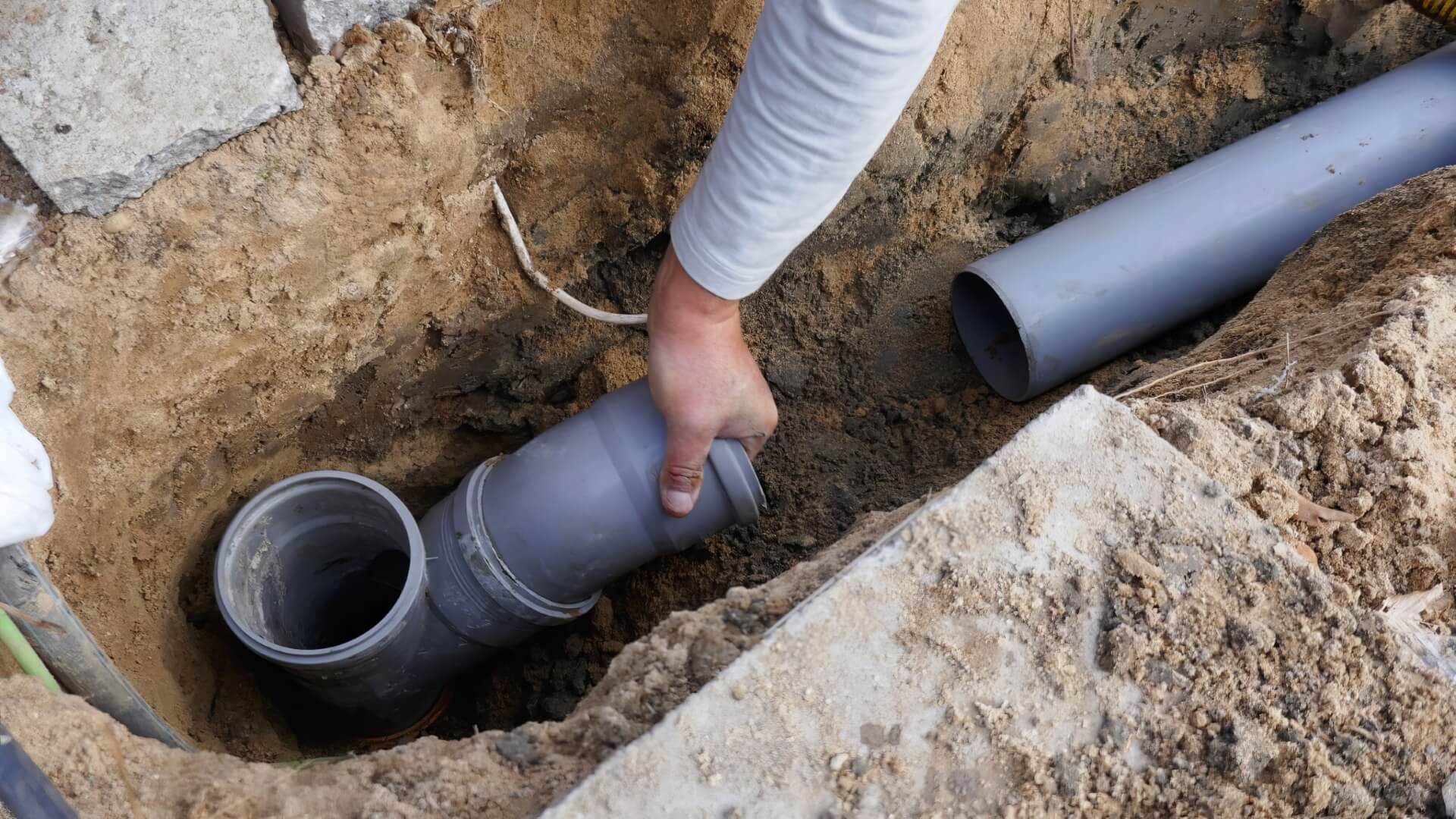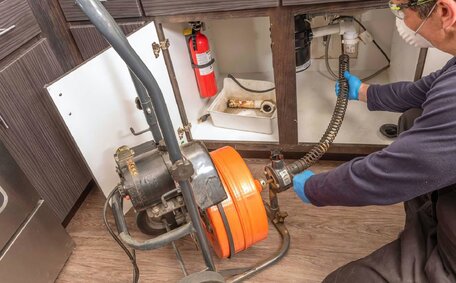The Dangers of Chemical Drain Cleaners
Liquid drain cleaners are common household items used for addressing a blocked drain. However, many are unaware that, beyond environmental harm, chemical drain cleaners can pose significant health risks that warrant attention.
Drain cleaners contain active ingredients such as harsh compounds like sulfuric acid, sodium hydroxide, and hydrochloric acid that work by breaking down blockages.
When poured down your sink, these chemicals corrode the organic material causing blockages, dissolving hair, grease, and food waste. While these chemicals can offer a temporary respite from clogged drains, they can damage your pipes, eroding them and potentially leading to severe complications over time.
Frequent use of harsh chemical drain solutions can ironically induce clogs, endangering your plumbing system and health—reflecting an ineffective and unsafe approach to maintenance. The fumes that drain cleaners can emit, particularly upon contact with water, can be hazardous and require caution for safe use.
In the event of accidental ingestion of chemical drain cleaner, immediate contact with a help hotline like local poison control is crucial. Even a minor exposure can cause severe burns to the esophagus and stomach, necessitating immediate medical intervention. Tragically, injuries and fatalities have resulted from such accidents.
Once washed down the drain, these pollutants can end up in the larger ecosystem, contaminating water supplies and harming wildlife habitats. Their toxic effects can persist and accumulate in the environment.
For household maintenance, particularly in places like Drummoyne and across Sydney, using chemical drain openers demands careful consideration. Maintaining the wellbeing of our families and neighbourhoods means choosing to use drain opener alternatives like enzyme-based solutions that break down organic matter without harm.
How Chemical Drain Cleaners Damage Pipes and Plumbing
Unlike the corrosive substances like sulfuric acid and sodium hydroxide found in many chemical cleaners, enzymes in certain drain cleaners can decompose organic matter without damaging plumbing materials.
Metal pipes and fixtures are particularly susceptible to damage when exposed to aggressive cleaning agents.
Acid drain cleaners, which often contain sulfuric acid, react with metals by corroding and eating away at surfaces. This can lead to leaks, bursting, and other issues, proving that drain cleaner can be quite problematic over time. Galvanised steel pipes are particularly prone to corrosion when exposed to acidic drain cleaners.
Plastic and PVC pipes can also be compromised by the harshness of chemical drain cleaners, becoming warped and misshapen. The caustic chemicals, including muriatic acid, cause the material to soften and melt. Cracks or joints may begin to leak after repeated exposure, making them a source of continual maintenance concerns.
Porcelain fixtures like your sink, tubs, and toilets are also at risk. The harsh ingredients in drain cleaners can eat away at the enamel glaze coating over time. This effect can eat away at your once pristine surfaces, leaving pits and flaws that allow water to seep into, potentially weakening and destroying the fixture.
Rubber parts, including gaskets and seals, can harden and crack upon contact with caustic drain cleaning chemicals. This can lead to leaks at joints and connections.
Regular use of chemical drain cleaners risks compromising infrastructure and could lead to significant problems down the line. Costly repairs may be required to fix damage caused over time. In Drummoyne, it’s prudent to opt for safe methods to clear clogs rather than resorting to liquid drain cleaners.
Health Risks of Chemical Drain Cleaners
Sodium hydroxide, known as lye or caustic soda, is especially hazardous to your skin. If ingested, it can be extremely harmful, causing severe burns of the mouth, throat, and stomach, potentially resulting in perforations or permanent scarring. Seek emergency medical attention immediately if ingestion occurs.
To prevent injuries, it is crucial to don protective gloves and goggles when you use chemical drain solutions to unclog drains. On an important note, never blend different drain cleaning products together to avoid triggering a perilous chemical reaction. It’s an important step to make sure the area is well ventilated before using any drain cleaner and minimise exposure to the potentially toxic fumes.
For households with children and pets, it is safer to avoid chemical drain cleaning products due to the high risk of accidental exposure. Our plumbing service in Drummoyne and Sydney suggests using non-hazardous alternatives that are equally effective and environmentally friendly.
Environmental Impact of Chemical Drain Cleaners
It’s critical to turn drain cleaners away from frequent use as they can wreak disastrous damage on the environment, filtering out from your sewage system into waterways. The active ingredients in these products such as sulfuric acid, sodium hydroxide, and hydrochloric acid are extremely toxic to aquatic life.
It’s clear that drain cleaners cause significant harm to aquatic life, including fish, plants, and microorganisms, even in small concentrations. Over time, entire ecosystems may become unbalanced and degraded. This poses a major threat here in Drummoyne where our harbours, rivers, and beaches are treasured.
Chemical cleaners can be devastating to your septic tank, as they interrupt the natural biological processes in both sewage treatment plants and septic systems. These substances may disrupt your home’s bacterial ecosystem, decimating essential organic material and leading to untreated sewage accumulation. Septic systems serving houses not connected to mains drainage are especially vulnerable.
They offer an effective alternative that is gentler on the environment. Households can do more than simply avoid, they can prevent harsh chemicals from entering waterways through drains, managing waste with environmentally considerate practices.
At our plumbing business, we aim to protect the beautiful natural environment around Drummoyne and greater Sydney. We advise customers to consider the environmental impact when choosing any chemical cleaning products for their home.
Employ a plunger with forceful plunging action to propel blockage-causing debris through your drainage system. Slowly plunge up and down while covering the overflow hole to build suction.
Using a drain snake or auger to navigate and dislodge stubborn clogs is an effective method for drain clearance. Insert the hooked end of the snake into your drain and twist to grab and pull out obstructions.
Unlike their chemical counterparts, enzyme drain cleaners leverage natural enzymes to safely disintegrate organic matter. They are non-corrosive and adept at handling waste such as grease food, safe for all drain types when used as directed. Enzymes liquefy grease and hair over 12-24 hours.
Regularly pouring a half cup of salt followed by boiling water down the drain can prevent clogs; the heat dislodges grease while the salt scrubs the pipes.
Simple, non-toxic methods can effectively clear clogs, helping to keep household drains flowing smoothly. Before resorting to commercial drain cleaners with their corrosive risks, consider using these safer options.
Knowing When to Engage a Professional Plumber
If your clog persists after trying alternatives like plungers, drain snakes, baking soda and vinegar, or enzyme cleaners, it’s time to call the experts who have specialised tools and expertise to tackle severe obstructions.
For tricky clogs deep in your main sewer drain, a plumber can safely use a line opener like hydrojetting to scour the blockage without chemicals. They can also video inspect the drain to identify and pinpoint the problem.
If you experience a complete clog and water backup, immediately shut off the water supply and contact a 24/7 emergency plumber to prevent flooding and water damage. Professionals have powerful equipment to clear away blockages in drains and pumps to remove backed up water.
For suspected pipe damage from tree roots or shifting foundations, a plumber can locate leaks and broken sections that could be harmful to your skin eyes, requiring repair or replacement. DIY drain cleaning products should never be used on compromised pipes.
Hiring professional plumbers like those at Drummoyne Plumbing ensures the issue is fully resolved using industry best practises. Our team offers a reliable local service for the Drummoyne area. Contact us today by email, appointment request, or phone call to get help with your stubborn drain clog.
Essential Tips for Maintaining Healthy Drains
To maintain unobstructed drains without resorting to harsh chemicals, consider the following routine maintenance tips:
- Use a drain strainer in sinks to catch food scraps, hair and other debris before it goes down the drain.
- Avoid pouring fats, oils and grease down drains. Let cool and dispose in the garbage instead.
- Only flush toilet paper and human waste down toilets. Never flush paper products such as wipes, feminine hygiene items, dental floss, or other trash.
- Inspect plumbing fixtures regularly for leaks and cracks that require repair to prevent clogs.
- Have a professional plumber snake your main sewer drain annually as preventative maintenance.
Taking good care of your drains with regular maintenance is the best way to avoid serious clogs and keep your plumbing system running smoothly for years to come.
To maintain unobstructed drains without resorting to harsh chemicals, consider the following routine maintenance tips:
Persistent clogs, despite attempts with DIY methods, signal the need for professional assistance ove service to prevent overflow, flooding, and subsequent water damage. Our team at Drummoyne Plumbing has the expertise to accurately diagnose and tell you more about drain problems and the right equipment to clear clogs, remove blockages, and perform needed repairs. To stave off minor issues escalating into major concerns, get in touch with us today for professional drain cleaning solutions that keep your plumbing operating smoothly.






